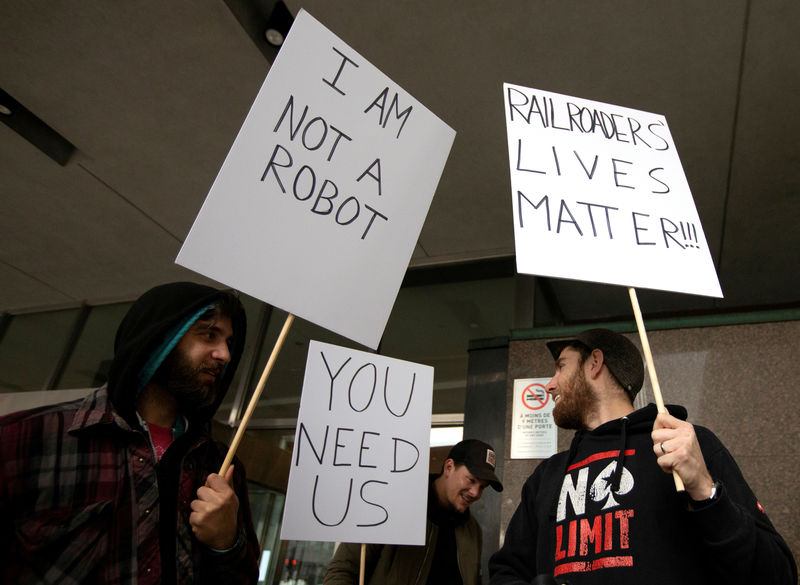By Allison Lampert
MONTREAL (Reuters) - As Canada's biggest rail strike in a decade dragged on with no resolution in sight, the recorded pleas of an exhausted rail worker who wanted a break after a 10-hour shift helped deliver a critical breakthrough, a union leader told Reuters on Tuesday.
The audio recording http://teamsterscanada.org/wp-content/uploads/2019/11/2018-Oct-19-exhausted-worker.mp3, released on Monday by Teamsters Canada, cut to the heart of workers' demands in the eight-day-old strike, which rippled through the country's economy from disrupted grain exports to planned layoffs.
While Reuters could not independently verify the recording, its release helped change public perception and acted as a catalyst for a deal reached on Tuesday with Canadian National Railway Co (TO:CNR), Teamsters Canada President François Laporte said.
The recording featured a conductor who wanted approval from government regulator Transport Canada before moving a train after a 10-hour shift.
"We are not refusing duty. You can log that. I have told you on recording that we are unfit for duty. We're past our 10th hour. We're up to almost 11 hours," the conductor says.
The supervisor responds if he does not move the train, he will consider it refusing to do the job and will request an investigation.
"Sir, that's your call. ...If I take this train now and we hit somebody, who is responsible for that now?" the conductor asks.
Teamsters, the union representing 3,200 CN workers, declined to disclose the name of the conductor but said he ultimately did not move the train and was suspended for 14 days without pay.
CN, which said on Monday that it is aware of the recording, did not offer an immediate comment on Tuesday.
Transport Canada said on Monday it had not received a complaint regarding the recording.
Transport Minister Marc Garneau on Tuesday declined to comment on the recording, but told reporters in Ottawa that efforts are under way by his government to improve fatigue management in the rail sector.
"This is the kind of situation we want to avoid," Laporte said of the recording. "We have to protect our people."
The agreement reached with CN Rail, Canada's largest railroad, will better protect thousands of workers from being reprimanded in cases where they are too tired to safely operate trains, Laporte said in an interview.
"When you repeat that you're fatigued, you won't be subject to discipline," Laporte told Reuters.

The tentative agreement must still be ratified by union members, including conductors and yard workers, with a vote expected in eight weeks, CN said.